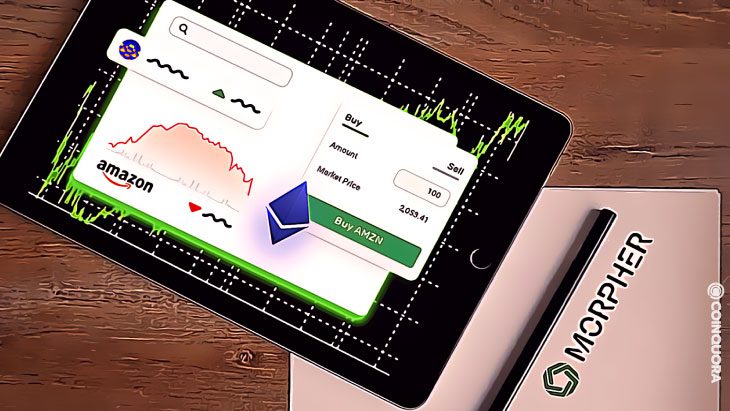Vienna,Austria – Decentralized Finance is an important part of the cryptocurrency domain, specializing in granting users universal access to financial products built on the blockchain. In the past, DeFi products have mainly catered to cryptocurrency users that seek out alternative means of generating alpha, often mimicking real-world financial frameworks.
The DeFi scene, for the most part, has served the mature cryptocurrency user base that has a sound understanding of how blockchain technology works. However, Morpher, a Startup based in Austria, has built a DeFi offering fit for the average person – with or without crypto knowledge.
Trading without a counterparty
Morpher is a trading platform built on smart contracts, which are self-executing applications built on a blockchain. Each smart contract serves a small function, a cog in the protocol that wholly facilitates the trading without any counterparties.
Traditional trading requires counterparties, whether it’s cryptocurrency or stocks: for one person to buy an asset, someone else has to sell it. Traders know that the availability of buyers and sellers at similar price levels is a determinant to a market’s liquidity. On Morpher, smart contracts perform that role.
That’s how Morpher is able to offer its users access to stocks, commodities, crypto, FX currencies, and indices, all in one place. The smart contracts receive real-time pricing data from multiple data sources, and Morpher’s users choose which markets they would like to stake Morpher’s native MPH token to. A user that wants to trade a stock will stake an amount of MPH to that market, and upon closing the position the smart-contract will return to the user their staked amount plus or minus the elapsed price-action difference. In practice, if a user goes long on Apple’s stock with 1000 MPH, and the stock price gains 10%, when the user closes the position they will receive 1000 MPH + 10% of their stake, a total of 1100 MPH.
By removing any constraints caused by equity ownership or liquidity, Morpher has created a seamless trading protocol that can virtualize any assets, making them tradable by anyone. This creates what the company calls “virtual futures.” And it is this virtualization that also allows Morpher to facilitate functions such as leverage, shorting, 24/7 access, and limit orders.
Morpher’s ERC20 token, MPH, is used as a settlement currency for all trades. Consequently, the token supply increases when token holders – on aggregate – perform well, and decreases when token holders have losing positions. In order to combat inflation, and lend the project to healthy tokenomics, the platform features spreads, and interest on margin interest, at levels similar – or lower – than that of traditional brokers.
Fixing trading for everyone
The virtualization of assets not only creates a more equitable trading environment for beginners, but it also empowers experienced traders in ways that might not be so obvious to novice users. For instance, the ability to trade stocks at the weekend gives traders more control over risk management, while freely short selling cryptocurrency makes it easier for cryptocurrency traders to participate in bear markets.
Furthermore, Morpher aims to address the inequality of access, especially when it comes to traditional markets, a problem that has led many traders to crypto in the first place. Morpher’s offering represents hope for as much as 80% of the world, who still have very limited access to western markets. The company’s main goal remains to ensure democratized access to all assets. To this end, the startup plans to use the investment raised as a part of its recently completed Series A round to expand its service in emerging countries and to decentralize its blockchain protocol to an extent that it operates independently of the company’s continued efforts.
Disclaimer: CoinQuora does not endorse any content or product on its page. While we aim to provide you with all relevant information that we could obtain, readers are encouraged to do their own research before taking any actions and bear full responsibility for their decisions. Please note that this article does not constitute investment advice.


